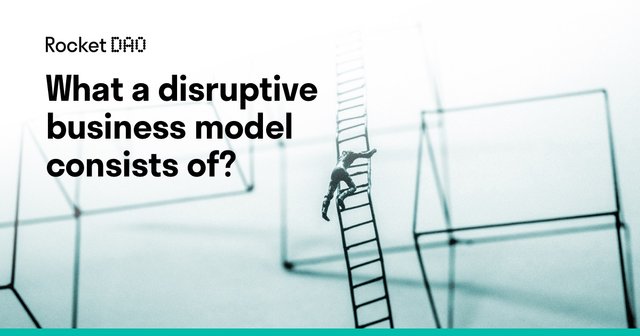What a disruptive business model consists of?
Is your business model really that excellent?

Specialists in startup analysis constantly debate which evaluation parameter is the most important one.
The one commonly accepted opinion among investors and business angels is that the team is an element of the real value for any startup. A strong team can cope with any milestones and hardships the project comes across along its way. The second question arises then: what is more important (from technological implementation point) - the product itself or a working business model?
Eventually, an expert community came to the conclusion that the product itself is an object which satisfies clients’ needs and at the same time it is an important element of the business model. It means that the product is the medium letting perform the functions necessary to meet customer needs; in case the business model is a good and efficient one, this medium can be changed depending on the functions performance quality.
It means that those startup teams which have quality competencies in the creation, variation, and development of business models are in greater demand only rather than the ones which are concentrated on tweaking of a perfect technical solution only. Perhaps this is partly the reason why the methodologies for startup's product and business model evaluation have been written by one expert.
But in real life, one can mention numerous stories when strategic investors back startups for their innovative technologies without paying much attention to the business model. So it is evident that in this case, a startup turns into a technology incubator with marketing hypotheses, but not a business incubator. That is why our experts developed a methodology for the technology due diligence, but this is the point to be discussed next time.
Business model evaluation methodology
The author of the business model evaluation methodology is Andrew Kuryan.
He is a TRIZ specialist who has been conducting researches of the most effective business models development techniques with the help of TRIZ instruments for many years already. Besides, he has created a service for testing and designing business models. That is why his methodology is of special interest for the expert community.
According to Andrew’s approach, a business model must be evaluated using 3 key parameters:
- Value creation schema;
- Value proposition potential;
- Costs structure.
For the value creation assessment one should take into account:
- Product novelty level (developing an absolutely new solution or improving an existing one);
- The degree of dependency on other companies;
- Control of the inbound and outbound logistics;
- Sales and clients systems (a third party or a self-developed platform);
- Clients system and support.
For the value proposition evaluation do matter:
- Having a critically different from competitors value proposition which can attract new customers and entice customers of the competitors;
- Product price offer;
- The ability to retain customers;
- Company’s scalability potential;
- Specifics of the paying procedure.
Costs structure analysis requires to pay special attention to:
- Customer Acquisition Cost which is calculated as
CAC = (Money + Time spent to attract a customer) / Number of new customers acquired.
- Customer Churn Rate means customers who cancel their subscription. This indicator is calculated as follows:
CCR = (Customers at the beginning of the month - Customers at the end of the month) / Customers at the beginning of the month.
- Absolute Operational Efficiency identifies the sources of efficiency loss between ideal performance and the best-observed performance, it means that it is equal to
AOE = (actual throughput) / (ideal throughput).
- Relative Operational Efficiency is the ratio of actual throughput compared the to best-observed throughput. Best observed throughput is often determined by using historical performance data.
ROE = (actual throughput) / (best observed throughput).
This is the right set of parameters to understand the efficiency extent of the business model.
Complicated business models
High tech companies are getting more and more complicated, so do the ways such projects generate profits. The first evaluation conducted using Andrew Kuryan's methodology reflected some problems in business model designing.
There are many startups developing mobile applications which will actually be free of charge for consumers. Such apps usually generate income selling advertisements. So the question is: which value should one assess evaluating a business model - of the app’s user or of the advertiser?
Solving this problem Rocket DAO experts came to the conclusion that an advertiser will not deal with a mobile product if it has no users who are truly loyal to this application. It means that creating value for users is one of the sub-objectives while creating value for advertisers. But the end-user of the application within any business model is the one who pays money to the project. In the case described above the end-user is evidently an advertiser.
Therefore only those startups will receive high evaluation scores which understand who their true customer is and what specific value they create to this main customer.
Conclusion
What is peculiar in our approach is that business model evaluation methodology is based on the specific quantitative metrics which make this evaluation a truly objective and unambiguous one. What is more, this methodology is applicable even for early-stage startups what will let them accumulate data and chose the proper way for further development.
Such a digitalization of the business model description which is proposed by Andrew Kuryan makes his methodology different qualitatively from those being used in acceleration procedures.
Author: Andrew Miroshnichenko
Translated by: Angelina Dmitruk
Website: https://rocketdao.io/
Blog: https://blog.rocketdao.io/
Linkedin: https://www.linkedin.com/company/rocket-dao/
Facebook: https://web.facebook.com/RocketDAO/
Discord: https://discord.gg/fhUfRn
Telegram (Rocket): https://t.me/RocketICOen
Telegram (Expert): https://t.me/rocketdaoexpert
Twitter: https://twitter.com/rocketdao_io
Medium: https://medium.com/@rocketdao
Bitcointalk: https://bitcointalk.org/index.php?topic=5033016.0
Instagram: https://www.instagram.com/rocketdao.io/
Reddit: https://www.reddit.com/r/RocketDAO/